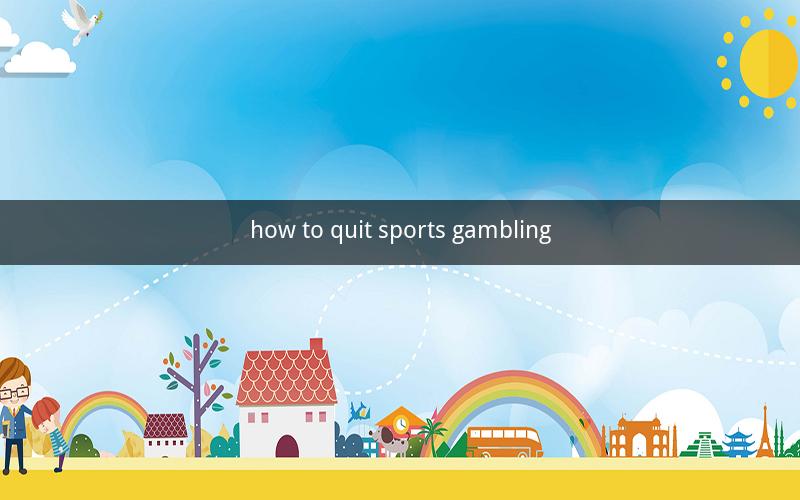
How to Quit Sports Gambling: A Comprehensive Guide
Table of Contents
1. Understanding the Problem
2. Identifying the Signs of Problem Gambling
3. The Psychological Impact of Sports Gambling
4. The Financial Consequences of Sports Gambling
5. Strategies for Quitting Sports Gambling
- Setting Clear Goals
- Building a Support System
- Identifying Triggers and Avoiding Them
- Developing Healthy Alternatives
- Seeking Professional Help
6. Legal and Ethical Considerations
7. Case Studies and Success Stories
8. Resources for Support and Further Reading
1. Understanding the Problem
Sports gambling has become increasingly popular in recent years, offering individuals the opportunity to engage in a form of entertainment that combines passion for sports with the thrill of betting. However, for some, this activity can quickly spiral out of control, leading to addiction and a range of negative consequences. Understanding the nature of sports gambling and its potential risks is the first step towards quitting.
2. Identifying the Signs of Problem Gambling
Recognizing the signs of problem gambling is crucial for taking the necessary steps to quit. Common signs include:
- Preoccupation with gambling, often at the expense of other responsibilities or interests.
- Needing to bet more money to achieve the same thrill.
- Feeling restless or irritable when attempting to cut down or stop gambling.
- Returning to gambling after losing money to try and recoup losses.
- Using gambling as a way to escape problems or negative emotions.
3. The Psychological Impact of Sports Gambling
Problem gambling can have a profound psychological impact on individuals. It can lead to feelings of guilt, shame, and despair, as well as increased anxiety and depression. Understanding these psychological effects can help in developing strategies to overcome addiction.
4. The Financial Consequences of Sports Gambling
The financial implications of sports gambling can be devastating. Individuals may find themselves in significant debt, leading to strained relationships, loss of employment, and even homelessness. Recognizing the financial risks is a critical component of quitting.
5. Strategies for Quitting Sports Gambling
Setting Clear Goals
Establishing clear, achievable goals is essential for successfully quitting sports gambling. These goals should be specific, measurable, attainable, relevant, and time-bound (SMART). For example, a goal might be to avoid placing bets for the next month.
Building a Support System
Surrounding oneself with a supportive network can greatly increase the chances of quitting successfully. This may include friends, family, or support groups dedicated to helping individuals overcome gambling addiction.
Identifying Triggers and Avoiding Them
Identifying the situations or emotions that trigger the urge to gamble is crucial. Once these triggers are identified, it is important to avoid them or develop coping mechanisms to deal with them.
Developing Healthy Alternatives
Finding healthy alternatives to gambling can help fill the void left by this activity. Activities such as exercise, hobbies, and socializing can provide a sense of fulfillment and distraction from the urge to gamble.
Seeking Professional Help
In some cases, seeking professional help may be necessary. Therapists, counselors, and support groups can provide the tools and support needed to overcome addiction.
6. Legal and Ethical Considerations
It is important to be aware of the legal and ethical implications of sports gambling. In many jurisdictions, gambling is illegal or heavily regulated, and engaging in it without proper knowledge of the laws can lead to serious consequences.
7. Case Studies and Success Stories
Reading case studies and success stories can be inspiring and encouraging. They provide real-life examples of individuals who have successfully quit sports gambling and offer hope to those struggling with addiction.
8. Resources for Support and Further Reading
For those looking to quit sports gambling, there are numerous resources available. These include:
- Gamblers Anonymous: A 12-step program designed to help individuals overcome gambling addiction.
- National Council on Problem Gambling: Offers resources, support, and treatment options for problem gamblers.
- Gamblers Help Online: Provides online support, resources, and a self-help guide for those struggling with gambling addiction.
Questions and Answers
1. What are the first steps in quitting sports gambling?
- The first steps include understanding the problem, identifying signs of problem gambling, and setting clear goals.
2. How can I build a support system to help me quit?
- You can build a support system by reaching out to friends, family, or joining support groups dedicated to helping individuals overcome gambling addiction.
3. What are some common triggers for sports gambling?
- Common triggers include boredom, stress, and the desire to escape negative emotions.
4. How can I develop healthy alternatives to gambling?
- You can develop healthy alternatives by engaging in activities such as exercise, hobbies, and socializing.
5. Is it necessary to seek professional help to quit sports gambling?
- While not necessary for everyone, seeking professional help can provide additional tools and support for overcoming addiction.
6. What legal and ethical considerations should I be aware of when quitting sports gambling?
- It is important to be aware of the laws and regulations in your jurisdiction regarding gambling, as well as the ethical implications of engaging in gambling activities.
7. Can reading case studies and success stories help me quit sports gambling?
- Yes, reading case studies and success stories can be inspiring and provide hope for individuals struggling with addiction.
8. Where can I find resources for support and further reading on quitting sports gambling?
- Resources can be found through organizations such as Gamblers Anonymous, the National Council on Problem Gambling, and Gamblers Help Online.
9. How long does it take to quit sports gambling?
- The time it takes to quit varies for each individual, but it is important to be patient and persistent.
10. What if I relapse after trying to quit sports gambling?
- If you relapse, it is important to learn from the experience and seek additional support. Relapse is a common part of the recovery process, and it does not mean that quitting is impossible.